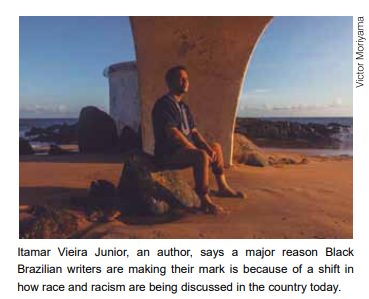(UNESP - 2023)Leia o texto para responder s queste
(UNESP - 2023)
Leia o texto para responder às questões de 13 a 18.
Black authors shake up Brazil’s literary scene

Itamar Vieira Junior, whose day job working for the Brazilian government on land reform took him deep into the impoverished countryside, knew next to nothing about the mainstream publishing industry when he put the final touches on a novel he had been writing on and off for decades. On a whim, in April 2018, he sent the manuscript for Torto Arado, which means crooked plow, to a literary contest in Portugal, wondering what the jury would make of the hardscrabble tale of two sisters in a rural district in northeastern Brazil where the legacy of slavery remains palpable.
To his astonishment, Torto Arado won the 2018 LeYa award, a major Portuguese-language literary prize focused on discovering new voices. The recognition jump-started Mr. Vieira’s career, making him a leading voice among the Black authors who have jolted Brazil’s literary establishment in recent years with imaginative and searing works that have found commercial success and critical acclaim.
Torto Arado was the best-selling book in Brazil in 2021, with more than 300,000 copies sold to date. The previous year, that distinction went to Djamila Ribeiro’s A Little Anti-Racist Handbook (Pequeno Manual Antirracista), a succinct and plainly written dissection of systemic racism in Brazil.
Mr. Vieira, a geographer, and Ms. Ribeiro, who studied philosophy, are part of a generation of Black Brazilians who became the first in their families to get a college degree, taking advantage of Federal Government programs. Mr. Vieira managed to use his day job at Brazil’s land reform agency, where he has worked since 2006, to do field research. He studied the politics and power dynamics that shape the lives of rural workers, including some who toil in conditions analogous to modern-day slavery. That experience, he said, made the characters in his novel more layered and their fictional hometown, Água Negra, which means black water, feel authentic.

The two authors are among the highest profile figures of a literary boom that includes Black contemporary writers and authors who are experiencing a revival. The clearest example is Carolina Maria de Jesus, who died in 1977 and whose memoir, Child of the Dark (Quarto de Despejo), is now a literary sensation, as it was when it was published in 1960. The book, a compilation of diary entries by Ms. Jesus, a single mother of three, offers a raw account of daily life in a São Paulo slum where dwellers picked through garbage for food and slept in shacks patched together with slabs of cardboard.
(Ernesto Londoño. www.nytimes.com, 12.02.2022. Adaptado.)
De acordo com a legenda da imagem que retrata Djamila Ribeiro, a escritora
qualifica-se como privilegiada no cenário literário contemporâneo.
percebeu que deveria participar de programas de apoio e incentivo a novos escritores.
acabou por fazer parte das esferas de poder que antes rejeitava.
considera os autores generosos por compartilharem suas histórias com os leitores.
justifica sua escolha de escrever de uma forma acessível.


